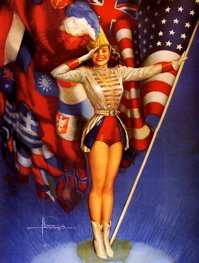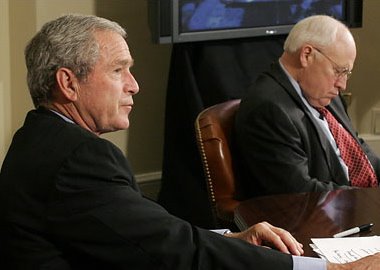With a lead of about 7200 votes, Virginia's US Senate candidate Jim Webb has been declared the winner by AP, though CNN isn't touching it until the incumbent George Allen officially concedes or makes a decision to recount.
I'm still in shock. The House, AND the Senate, AND Rummy's on permanent vacation. I was feeling so cynical, so pessimistic, that I wasn't even sure we'd take the House. Of course, I spent a good chunk of election day trapped on I-35, well behind a jack-knifed semi, with a 2 year old in the car who hadn't had lunch, stuck under a Burger King sign. (The kind of stuck where people get out of their cars and start talking to their new neighbors.) So I wasn't feeling too hopeful about anything.
Eventually things started moving again and we finally got home. Is that what is happening to our country too? Lord, I hope so. If you pray, now might be a good time.
Of course, when we talk about "our country" in terms of elections, we're talking about "likely voters". I don't have the exact figures of who did vote, but Texas going in to the election was predicting a 36% turnout.
That means that A MAJORITY OF TEXANS DID NOT EVEN VOTE. I don't have national figures but I can't imagine they are much different.
Look around you. Out of the ten people in your immediate vincinity at the internet cafe or office cubicle farm, only three or four of you voted. If you did, then only 2 or 3 of the folks within earshot did too.
All these polls about "likely voters", but I want to know what unlikely voters think. What about those other 64%?
Pundits like to tell us that "the country" is this or that, we're leaning left, we are mostly churchgoers, we're leaning right, we want to throw the bums out, we think gay marriage and pot should be illegal-- but are we? Do we? Is Texas even really a Red State? What we are told about ourselves is really just what 1/3 of us think and feel. What would happen if the majority of us weighed in?
What would happen if you polled those unlikely voters? Would we find out that most of us aren't churchgoers, we're fine with gay marriage, we don't want legal gambling (I'm just rambling) or that we actually lean way more left (or way more right) than we've been hearing all these years?
Which brings me to another point I've been musing about. What is the role of a candidate (or elected official) in relation to their constituency?
One theory would be that "the elected official is meant to represent the feelings of a majority of the citizens." In other words, we don't have time to make all the decisions, so we pick someone who thinks like us and will say what we would say, and send them to the meetings in our place. Another is, "the elected official should stick by his or her principles, and the citizenry votes whether or not we like those principles and want them to represent us." I feel like we're seeing more and more of this, candidates telling us who we are.
OK, let's take good ol' Anytown, USA. "The Fightin' Anytonians" (as Colbert would say) have a population of 200 people, and everyone knows everyone. The people of Anytown like it quiet, especially at night. Most of them want a noise ordinance in place to keep it quiet. This affects the local nightclub business (that's Ted, owner of "The We Won't Tell Saloon"). An election for Mayor is coming up. A young ambitious recent grad wants to run.
So here's my question. Is he supposed to:
a) go around and find out that most people like it quiet, and he wants to be Mayor, and a Mayor is meant to represent the views of the majority, so he runs on a pro-ordinance platform, or
b) does he look in his own heart and say, "Well, I play guitar in my spare time and I don't like noise ordinances, so I'm going to run as a candidate against it and try to get more people than just Ted to vote for me."
The difference is, in one scenario the citizens are the dog, and in the other they're the leash.
A candidate who tries to accurately reflect his constituency can be accused of pandering. And he might get into trouble if he is asked to decide something that the public hadn't weighed in on. However, it doesn't seem like it's his job to change us. We are who we are, we want what we want-- though that can be affected by our environment, pop culture, the Daily Show, our families, and other people that we respect, like a pastor or Walter Kronkite. We have plenty of people telling us what to think, shouldn't our representative represent us and be a reflection of what we think?
To tie these ideas together, wouldn't it be a good idea for a candidate to find out what the unlikely voters want too, and really get a sense of what the whole district wants and doesn't want (not just 36% of it), and then sell himself as someone who can make these things happen and get a groundswell of previously-unlikely voters? Isn't that his responsibility, to accurately represent us? Or is his responsibility to have certain convictions and convince us that those convictions will steer the district into a healthy situation?
I need more coffee. Weigh in, people, please!
Thursday, November 09, 2006
Webb in? and other musings
Posted by
LMP
at
10:18 AM
![]()
Labels: 2006 Midterms
Subscribe to:
Post Comments (Atom)






No comments:
Post a Comment